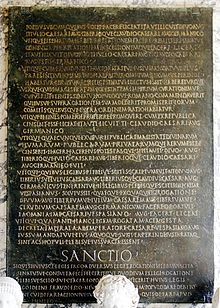
Ius or Jus (Latin, plural iura)[2] in ancient Rome was a right to which a citizen (civis) was entitled by virtue of his citizenship (civitas). The iura were specified by laws, so ius sometimes meant law. As one went to the law courts to sue for one's rights, ius also meant justice and the place where justice was sought.[3]
On the whole, the Romans valued their rights as the greatest good of Roman citizenship (civitas romana), as opposed to citizenship in other city-states under the jurisdiction of Rome but without Roman rights. Outsiders (peregrini) and freedmen (libertini) perforce used Roman lawyers to represent them in actions undertaken under the jurisdiction of Roman law. Representation was one of the civic obligations (munera) owed to the state by citizens. These munera (on which account the citizens were municipes) included military service as well as paying taxes, but specialized obligations might also be associated with functions of elected offices or assigned by the government, such as paying the cost of road or aqueduct maintenance. Some of these functions were highly lucrative, such as tax collecting, since the collector collected much more than he owed the government, but for the most part functionaries were appointed for their wealth and were expected to assume the costs as their munus. If they did not, they were tried and sometimes executed. Violation of the iura of other citizens, whether in office or out, was a serious matter, for which the punishment might be death.
- ^ Hellems, Fred B.R. (1902). Lex de Imperio Vespasiani: A consideration of some of the constitutional aspects of the principate at Rome, a Thesis. Chicago: Scott, Foresman and Company. pp. 4–5.
- ^ The Roman alphabet had no "j"; the Romans used "i" only. In the mediaeval period Latin words beginning with i + a vowel were back-formed with a j- to represent the y- sound. Dictionaries do or do not use the j- by editorial decision.
- ^ Lewis & Short 2007, Jus
© MMXXIII Rich X Search. We shall prevail. All rights reserved. Rich X Search
